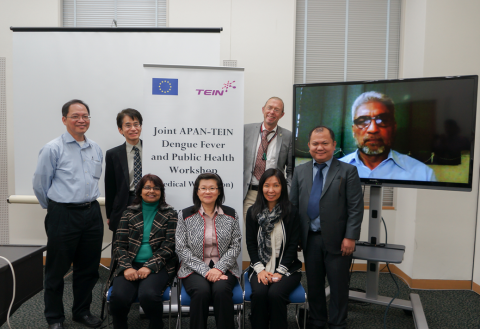
1st March, 2015, Fukuoka, Japan
Following the successful first joint APAN-TEIN dengue fever workshop held at the 37th Asia Pacific Advanced Networking (APAN) meeting in January 2014 in Bandung, Indonesia, a second dedicated event took place at the recent 38th APAN meeting in Fukuoka, Japan.
Part of the programme for the established APAN Medical Working Group, the workshop was held on 1st March 2015, attracting over 20 attendees, including clinicians and researchers from within the multi-disciplinary dengue fever community, public health officials as well as National Research and Education Network (NREN) representatives from across the Asia-Pacific region, Europe and Africa.
The workshop provided a forum to take stock of developments since the Bandung meeting, to share experiences and discuss best practices, mobilising a community dedicated to helping combat the spread of this devastating disease. The recent dengue fever outbreak in Japan— after 70 years since the last outbreak—made the workshop and its location particularly relevant for local clinicians and public heath personnel. In the run-up to the workshop they had opportunities to join colleagues and network professionals in a series of videoconferences to share relevant expertise.
In addition to the discussion of dengue fever management specifically for Japan, the presentations covered a wide range of topics, from global fatality trends, dengue case classification to case management and climate impact studies.
Joining the discussion remotely via videoconference, Annelies Wilder-Smith, Professor of Infectious Diseases and Global Health at the Lee Kong Chian School of Medicine in Singapore and Scientific Coordinator of the EU-funded DengueTools project, focused her presentation on the impact of climate change and global travel as main drivers for the spread of dengue from endemic to previously uninfected regions.
Dr Olaf Horstick, Director of Teaching Unit at the Institute of Public Health, University Hospital Heidelberg, Germany provided an overview of the WHO dengue case classification and evidence of its application whilst Dr Raul Destura, Director of the Institute of Molecular Biology and Biotechnology at the UP National Institute of Health, Philippines, presented on the molecular characterisation of the dengue virus in the Philippines and the impact of the introduction of different genotypes.
Prof. Leo Yee Sin from the Tan Tock Seng Hospital in Singapore outlined dengue management in Singapore and Dr Saleem Rana from Contech International School of Public Health in Lahore, Pakistan highlighted the importance of demographic factors, such as age-sex specific mortality analysis, for informed and effective health policy decisions.
When it comes to stopping dengue, social media posts and tweeting may be just what the doctor ordered. This was a key message in the presentation by Prof. May O. Lwin who explained how the social-media based Mo-Buzz system, developed by researchers at Nanyang Technological University, can boost the authorities’ efforts to keep a constant eye on the spread of dengue in Sri Lanka.
One of the highlights of the workshop was the remote participation of Dr Misaki Wayengera, Uganda’s principal investigator of the Ebola rapid diagnostic kit, who presented on the situation and prevention of Ebola in his country. Although Ebola has so far not hit Asia, participants recognised that, similarly to dengue, global mobility might facilitate its spread to other regions.
Participants enthusiastically agreed to build on the positive experience of the workshop and NREN-supported videoconferencing by following up with virtual meetings around specific topics and areas of research interest.
Other suggestions that generated substantial interest included enabling three or more sites to join regular clinician case reviews using the videoconferencing system supported by R&E networks, organising online training courses for public heath personnel focusing on dengue, and creating FAQs for dissemination via online community portals to help address concerns around dengue and at the same time dispel myths.
The driving force behind the workshop and the idea of the NREN and medical communities joining forces, Prof. Francis Lee, President of SingAREN and Chair of Governors of TEIN*CC, commented: “Building communities is not a one-time effort. Within 6 months after the Bandung meeting a second workshop was held in the Caribbean where organisers sought to develop new approaches to leverage R&E networks in the region to combat dengue and Chikungunya. The workshop idea was subsequently also embraced by colleagues in Africa, adapting it to the challenge of sharing expertise to treat and stop the spread of Ebola. This just shows the scalable nature of our efforts to build communities – and building communities is the best way to affect real change!”
The presentations can be downloaded from
https://www-lk.apan.net/meetings/Fukuoka2015/Sessions/session.php?id=37
If you wish to find out more about this Dengue Fever initiative or want to join the next virtual workshop, please contact Prof. Francis Lee at ebslee@ntu.edu.sg
TEIN*CC is an active member the global community of National Research & Education Networks (NRENs) that power and support collaborative, cutting-edge, data-intensive research and education. This “network of networks” connects researchers, teachers, students and innovators from the four corners of the world to one another, and to the data, software, equipment and hardware at the forefront of digital discovery. This global community is fueled by a strong collaborative spirit and a drive to push technical boundaries to create new knowledge, and ways to use that knowledge, to address society’s most vital challenges.